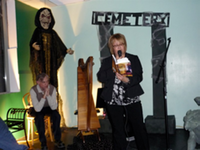
Fiction writers do a weird kind of story-dance where they take snippets from their real life, and reinvent them for the sake of the story. Every fiction writer will tell you - swear up and down - fiction is just that, fiction. But underneath the words, lie real events. And so it is with Dead Girl Diaries, a story narrated from the viewpoint of a ghost. I grew up in Brockville, Ontario, in an old house with lots of places for ghosts to roam - the dank dark stone cellar, the sagging enclosed porch that ran the full length of the house, the parlor where my older brother sometimes slept and woke screaming from deep dreams, and where my mother told us the old lady who once owned the house had died. The room never had the feeling of safety and we always felt uneasy in it, never used it as a sitting room, never put big easy armchairs there for people to gather and chat. Instead, it was used as a passageway - a space we had to go through to get to other parts of the house. Passing through the parlor was inevitable. We never lingered.
French glass doors separated the parlor from the living room. In the corner behind the French doors was my deceased grandfather’s prized tea trolley, and where my mother saw him, or rather, his ghost. He polished the glass windows - things had become muddied, he said, and she took that as a premonition. And then there was the ghost that frequented our backyard. The backyard was huge and had century-old trees and bushes planted long before we bought the house. My father spent one day furiously pulling out old growth. That’s when he felt the sudden wind stirring the brush, and my mother saw the ghost. They always believed the original owner of the house, who designed the gardens and now long dead, had returned from the spirit world to inspect my father’s work.
Across the street from our house was the stately (and upper-crust) St. Peter’s Anglican Church, where sometimes in the wee hours, organ music drifted out, although the building was in blackness. We always believed the church was haunted, and hurried past it when returning home at night. On humid summer evenings my mother and a next-door neighbor sat on the screened porch of the side of the house, and summoned the dead with the Ouija board. That abruptly ended when Mrs Fawcett, a matronly and holier-than-thou Pentecostal widow, spelled out the word “fornicate”with the planchette. Not once, but three times. She claimed in horror that she had no control over the letters that madly tumbled out beneath her fingers, that a malevolent spirit must be there with them on the porch. I like to think that it was a ghost with a sense of humour, and a healthy anti-fundamentalist attitude.
My father had his ghosts, too. But like the character George in the novel, he spoke of his father’s ghost sightings. There are a lot of phantoms in the loneliness of the farm on a prairie night - my grandparents lived on a isolated farm near Austin, Manitoba. Growing up, I often heard the story of the line of dancing ghosts passing right through my grandfather on a dark road, ghost-girls dressed like gypsies. That unearthly happening made it into the novel. And then another prairie ghost tale, where my grandfather was awakened by the clear tinkling of sleigh bells against the silence of the “below zero” winter night. He went out to greet the visitor - but there was no one, the snow on the county road undisturbed - no hoof marks, no sleigh tracks.
I grew up in a house where my mother read all the time - for escape perhaps - but regardless the reason, books on ESP, reincarnation, the afterlife, and miracles were strewn about our house - Edgar Cayce, Jeanne Dixon, Kathryn Khulman, Norman Vincent Peale. Many times I heard the phrase “the power of positive thinking” - as if thought were magical, and could bend spoons and influence events faraway. My mother did indeed pull out her Hoover washing tub during the spin cycle to explain the existence of the spirit world, spinning all around us, just as Golda explained it to Maxine in Dead Girl Diaries. I believed her - what ten year old wouldn’t? And you know, in some odd and comforting way, it still makes perfect sense to my adult self.
